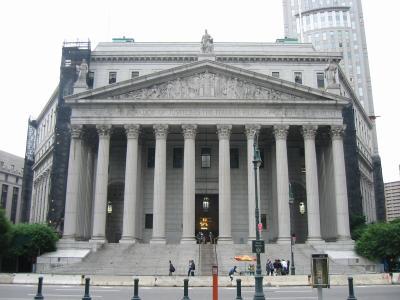Histories of libraries are important because they help to both validate the existence of libraries and authenticate their records of service over time. This is why we are so grateful to our colleague Julie Gick for writing and granting us permission to post her meticulously researched article, HISTORY OF THE NEW YORK COUNTY SUPREME COURT LIBRARIES, on this blog. It includes information about both the Civil Term and the Criminal Term libraries of the New York County Supreme Court and certainly meets the criteria mentioned above regarding the importance of library histories. We encourage you to read this very informative and entertaining article
David Badertscher.
Note: This article has been updated to include additional information provided by the author on October 27, 2008
History of the New York County Supreme Court Libraries
BY Julie Gick*
Beginnings
The New York County Supreme Court Law Library’s enabling statute was Chapter 722, Laws of 1865, effective May 12, 1865, although Griswold gives a starting date of 1852. (1)
The library was first known as the New York Law Library, and justices of the Supreme Court of the First Judicial District were its trustees.
The statute required trustees of the State Library to place in the new library any duplicate books in their possession which they deemed proper and the Clerk of the Court of Appeals was required to send one copy of the printed cases and points in all Court of Appeal cases. Any person who willfully injured any of the books, furniture or property of the new library was guilty of a misdemeanor. The sum of $5000 was appropriated for the use of the library. In 1879 the librarian’s salary was $1,500. The New York Times expressed concern about the court’s expenditures. (2)
Buildings

The law library was first located at 32 Chambers Street. This building is variously known as the Court of General Sessions, Marine Court and City Court. (3) The architect may have been John McComb,Jr. who designed the new City Hall and other buildings in the area.

Architects John Kellum and Leipold Eidlitz designed the Tweed Courthouse, 52 Chambers Street at an estimated cost of $11-12 million. Also known as the Old New York County Courthouse, the library relocated to this new facility when it was completed in 1881. Over the years the library served as a lounge room, reference room, and sometimes as a courtroom. Although a handsome edifice the courthouse suffered from inadequate space and unsanitary conditions. The deaths of several justices and many clerks and court officers had been attributed to a malodorous and pestilential atmosphere pervading certain courtrooms. (4)

After the appellate branch was created effective January 1, 1896, the books and the Supreme Court librarian were assigned to the new court’s temporary quarters on the third floor at 111 Fifth Avenue corner of 18th Street. The Supreme Court Library was replaced by books from other courts, and an assistant librarian was hired to maintain its collection. In 1900 the Appellate Division 1st Department moved to its present quarters at 27 Madison Avenue. James B. Lord was the architect. He completed the building under budget for approximately $630,000. He died of a lingering illness said to be directly caused by a court proceeding. (5)

In 1907 the Emigrant Industrial Savings Bank, located at 49 Chambers Street, purchased the adjoining property at 43 – 47 Chambers Street. An architect named Raymond F. Almirall was hired to design a new building for the entire expanded lot. This was completed in 1912. At seventeen stories it was one of the tallest of the early skyscrapers in the downtown area. On March 15, 1912 the justices of the Supreme Court decided to move their offices and the library to this building. The library was located on the 12th floor. It was 25 x 100 feet and contained 5110 feet of shelving. (6)

The present day New York County Courthouse, 60 Centre Street, was completed in 1927 at an estimated cost of $30,000,000. It was modified into a hexagonal structure from the original plan. The architect was Guy Lowell who in 1913 won a competition for his striking circular design. A week before the scheduled opening, Mr. Lowell died suddenly in Madeira, Spain. This is the home of the Supreme Court Civil Term Law Library. (7)

The New York County Supreme Court Criminal Term Law Library is located in the Criminal Courts Building. This edifice was completed in 1938 at a cost of $14 million, and was designed by architects Wiley Corbett and Charles B. Meyers. Until the merger in 1962 the Law Library served as the library for the Court of General Sessions which had its own impressive history. The first Presiding Judge (then called a Recorder) was James Graham who served from 1683 to 1688. At the time it was discontinued and made part of the Supreme Court in 1962, the Court of General Sessions was known as the oldest continuously functioning criminal court in the United States. (8)

Prior to the creation of the 12th Judicial District Bronx Supreme Court Library was a part of the New York Supreme Court 1st JD. The courthouse was built in 1933 at a cost of $8 million and designed by Max Hausel and Joseph H. Freedlander. It is also known as the Mario Merola Building. (9)

The New York County Courts Public Access Law Library opened February 14, 1995 and provides legal materials and information to the public. It is located at 80 Centre Street. The building, completed 1928-1930 at a cost $6 million was designed by William E. Haugaard, the state architect, under a height restriction so that it would not overshadow the nearby courthouses. (10)
Continue reading











